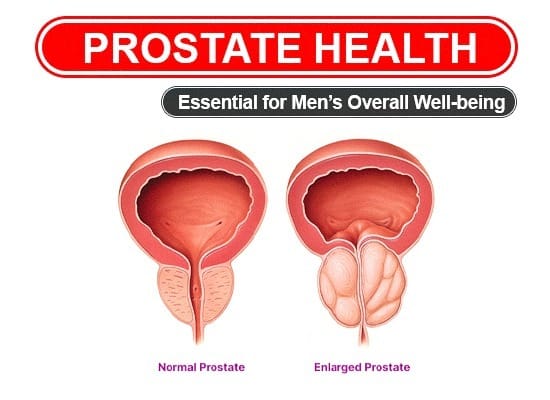Prostate Health: Essential for Men’s Overall Well-being
Why Prostate Health Should Be a Priority
The prostate’s role in reproduction and urinary function makes it an essential part of the male anatomy. Over time, the gland can develop conditions that affect a man’s quality of life. Three major prostate-related issues include:

- Benign Prostatic Hyperplasia (BPH): A non-cancerous enlargement of the prostate that can obstruct the flow of urine, leading to frequent urination and other urinary issues.
- Prostatitis: An inflammation of the prostate, often caused by infection. It can result in discomfort, urinary problems, and sometimes fever.
- Prostate Cancer: This is among the most common cancers in men. Early detection is critical for successful treatment outcomes
Common Symptoms of Prostate Problems
- Difficulty starting or stopping urination.
- Increased frequency of urination, particularly at night.
- Weak or interrupted urine flow.
- Painful or burning urination.
- Persistent pelvic or lower back pain.
- Blood in urine or semen.
Steps to Maintain Prostate Health
1. Adopt a Healthy Diet
Eating nutritious foods supports overall health, including the prostate. Consider including the following in your diet:
- Tomatoes: A rich source of lycopene, an antioxidant that supports prostate health.
- Cruciferous Vegetables: Vegetables like broccoli and cabbage contain compounds that may lower cancer risk.
- Fatty Fish: Omega-3 fatty acids in fish like salmon help reduce inflammation.
- Nuts and Seeds: High in zinc, a mineral essential for maintaining prostate function.
- Fruits and Vegetables: A diet rich in fresh fruit and vegetables is very beneficial for prostate health.
2. Exercise Regularly
Staying active helps maintain a healthy weight, improve circulation, and reduce stress—all factors that benefit prostate health. Activities such as brisk walking, swimming, or yoga can be particularly effective.
3. Limit Smoking and Alcohol Consumption
Both smoking and excessive alcohol intake can negatively affect prostate and overall health. Cutting back can significantly lower your risk of developing serious conditions.
4. Stay Hydrated
Proper hydration is vital for urinary tract health and supports the smooth functioning of the prostate.
5. Schedule Regular Screenings
Men over 50 should consider routine prostate screenings, including PSA (Prostate-Specific Antigen) tests and digital rectal exams (DRE). If there is a family history of prostate issues, screenings should begin earlier, around 40 or 45.
Advanced Prostate Care at Mukat Hospital
Mukat Hospital offers comprehensive care for all prostate-related conditions. Our team of specialists utilize advanced diagnostic tools and cutting-edge treatments to manage conditions like BPH, prostatitis, and prostate cancer. Whether it’s preventive care or tailored treatment plans, we are dedicated to helping men lead healthier lives.












